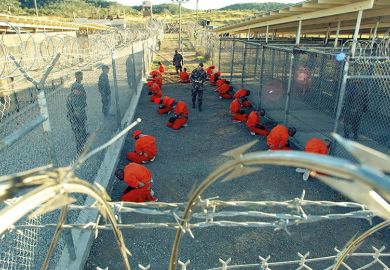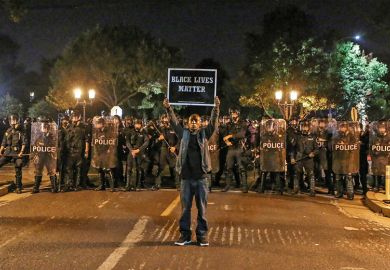Human rights have always been selective and imperfect, but at the moment there is an unabashed brutality at work in Europe and the United States that we haven’t seen since the UN proudly declared a new age of Universal Human Rights 70 years ago this December. Western politicians rediscovered an appetite for playing fast and loose with human rights and international law during the War on Terror. Fifteen years on, it’s not just the bad guys we’re prepared to lock up and harm. Now it is apparently also fine to leave refugees and migrants to languish in squalid camps, imprison their children and abrade basic human rights with deliberately hostile bureaucratic systems.
For many in the US, this has felt like a particularly ignominious fall from moral grace. From Thomas Jefferson and the Declaration of Independence through to Franklin Roosevelt’s Four Freedoms in 1941, and Eleanor Roosevelt’s key role in drafting the Universal Declaration of Human Rights in 1948, the US can claim a long and distinguished history in rights talk, even as it has often been slower to walk the rights walk when it comes to holding itself as accountable as other powers.
It was not until the 1970s that the US recognised the benefits of owning a powerful moral-political and international language for doing good (and otherwise) in the world, as historian Samuel Moyn argued in his myth-busting The Last Utopia: Human Rights in History (2010). Jimmy Carter committed the US to human rights in his 1977 inaugural address, the same year as Amnesty International won the Nobel Peace Prize. Yet even before Guantánamo and the Torture Memos, the contradictions of the US’ commitment to human rights were plain to see. One of the things human rights does best is embarrass power with the truth. Human rights activists and writers in the US have always wanted more justice than their politicians have been prepared to concede. The last Utopia may now be fatally damaged, but it is not quite dead.
In his new book, James Dawes argues persuasively that one of the places we might still find vibrant and critical human rights is in the contemporary American novel. In fact, the “American novel of human rights” is now a genre of its own. This is not perhaps such a surprising claim. When human rights are as dismissed and reviled as they are currently, the American novel might indeed be one of their last forms. Like binge-watching old episodes of West Wing , the novel of human rights at least reminds us of the better angels of America’s nature.
The novels Dawes is drawn to are sceptical and pragmatic, ill at ease with themselves, the US and, indeed, human rights. Those such as Nathan Englander’s The Ministry of Special Cases (2007), Francisco Goldman’s The Long Night of White Chickens (1992) and Chris Abani’s The Secret History of Las Vegas (2014) are anything but ethical balms. At the heart of this book, then, is a proper moral and political question for our times: if we can learn to read the novel of human rights, can we learn to do human rights better, too?
Probably not, but the book does have some important things to say about the relationship between the humanities and human rights, morals and politics, in our presently grim situation.
The contemporary American novel of human rights emerges as a complex refraction of idealism and self-abasement, advocacy and critique, righteousness and dismay. Pretty much, one might say, like the human rights movement itself. Yet, in making a case for the complexity of this new genre of novel, Dawes also demonstrates a returned moral purpose for literary criticism. He is a patient and careful close reader, alert to paradox, excellent at taking the slow path to moral irony. Literary critics have long loved ambiguity and difficulty. In the novel of human rights, ambiguities and impasses are ways of asking hard and timely questions.
Justice, for example, is a concept obviously central to human rights. It can mean the fair distribution of wealth and opportunity or, more narrowly, finding a form of closure in the wake of atrocity. In the American novel of human rights, it is the latter “justice plot” that prevails. This is not surprising given the US’ historical reluctance to see human rights as also being economic and social rights. But Dawes shows how this narrower understanding of justice cannot escape difficult questions about power and privilege: “How do you act for justice in a specific place when your right to claim authority in that place is precisely what is at question? How do you act out of care for others when your well-intentioned interventions involves [sic] not only altruism but also the projection of your own anxieties, conflicts, and needs onto the other?”
These are precisely the questions that need asking of a human rights project that is widely condemned in the rest of the world for hiding economic and political swagger in the language of humanitarianism, reckless interventionism and a frequently catastrophic moral narcissism. Dawes gets his novels to ask these questions for him, even if that means sometimes being hard on the authors’ aesthetic and moral purposes.
The most common claim made about the value of the arts to human rights is that, because they teach us empathy, they encourage a more open and charitable view of other people. Dawes gently pulls us in an altogether different direction. His final chapter is a keen analysis of perpetrators in novels of human rights. He is not interested in empathising with perpetrators, but he is committed to understanding how it is that evil happens in the world. His last book, Evil Men (2013), was a brilliant analysis based on interviews with Japanese war criminals who committed atrocities in the Sino-Japanese War of 1937-45.
Like the political philosopher Hannah Arendt, Dawes eschews melodrama in favour of a more patient understanding of the lethal banalities of everyday atrocity. Arendt taught us how political cultures of impunity, mendacity and brutality can tempt us into retreating into our own imaginary worlds (she would have hated Twitter). Fiction, she also claimed, far from being yet another form of escapism, can be a means of enduring an intolerable reality by facing up to it. The best stories are those that ask us to confront what is most difficult in the world, not simply to empathise with those who are its victims.
In an age of clickbait and easy outrage, The Novel of Human Rights is a welcome example of slow reading, hard thinking and the value of reality-testing in dire political times. Dawes teaches at Macalester, a liberal arts college which, like Bard College, was one of the first higher education institutions in the United States to embed the teaching of human rights within a humanities curriculum. If we really wanted to learn how to do human rights better, we would employ more excellent literature professors to train greater numbers of young people to think critically, sceptically, creatively and, above all, honestly about what it means to share the world with other people.
But liberal arts colleges and, increasingly, humanities degrees themselves are not open to the many. Indeed, critics from both the left and right have charged that it is because they have too long been the privilege of an elite that human rights are in such a mess now. Nor is it a coincidence that the same people who rubbish human rights also question the value of a humanities education. The response to these claims is not to shut up either shop. As this book shows, it is rather to argue strongly for the considered and complex scepticism that the novel and the arts in general, at their best, insist upon.
Lyndsey Stonebridge is professor of humanities and human rights at the University of Birmingham. Her latest book, Placeless People: Writing, Rights, and Refugees, will be published by Oxford University Press next month.
The Novel of Human Rights
By James Dawes
Harvard University Press
240pp, £21.95
ISBN 9780674986442
Published 28 September 2018
The author
James Dawes, DeWitt Wallace professor of English at Macalester, was born in Alexandria, Virginia, a suburb outside Washington DC, during the era dominated by Ronald Reagan and Margaret Thatcher, which he recalls as “a time of simultaneous political turmoil and extreme disengagement”.
He received his MPhil from the University of Cambridge and a PhD in English literature from Harvard. “UK Cambridge was wrenchingly beautiful and full of intellectually staggering people,” he notes. “US Cambridge was also full of intellectually staggering people but did not have punting.”
“Human rights work”, in Dawes’ view, “is fundamentally a matter of storytelling”. In his last two books – That the World May Know: Bearing Witness to Atrocity (2007) and Evil Men (2013) – he opted to “focus primarily on fieldwork and interviews with human rights workers, survivors of atrocity and perpetrators of crimes against humanity”. Yet his fieldwork was “always deeply informed by the novels I was reading and teaching. So it has been very interesting for me as a literary critic to begin to see how the two overlap: how the novel as a form has changed in response to the evolution of the modern human rights movement, and how the modern human rights movement has changed in response to the novel as well.”
So what would Dawes see as the crucial lessons that policymakers might learn from serious fiction (if they could be convinced to read it)?
“A few years ago,” he responds, “I would have said something about the dangers of good intentions, of ill-informed, narcissistic do-gooderism. Now I would say that the novels dramatically demonstrate the way history will hold us accountable for the unfeeling cruelty we direct towards those who we consider ‘others’.”
Matthew Reisz
POSTSCRIPT:
Print headline: Asking difficult questions
Register to continue
Why register?
- Registration is free and only takes a moment
- Once registered, you can read 3 articles a month
- Sign up for our newsletter
Subscribe
Or subscribe for unlimited access to:
- Unlimited access to news, views, insights & reviews
- Digital editions
- Digital access to THE’s university and college rankings analysis
Already registered or a current subscriber?








